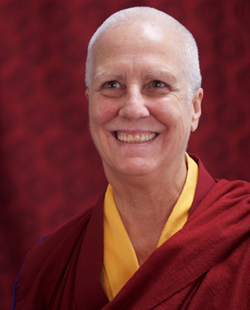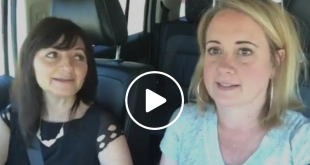
Ginny Woods is an everyday woman living in the foothills of Northern California. Ginny is many things, among them a mother of four, grandmother, registered nurse, Traditional Chinese Acupressure Therapist, certified Chinese massage therapist and instructor, Reiki master teacher, and an ordained Tibetan Buddhist nun. In 2000, Ginny began traveling to China to train at the famed Beijing Massage Hospital. After 20 years of Buddhist practice, she made a second trip to India to receive ordination as a Tibetan Buddhist nun of the Kagyu lineage. She is now called by her spiritual name, ani Karma Drolma. Ordination has deepened her commitment to help end the suffering of all sentient beings by empowering people to become all they are capable of being. She does this by putting compassion into action through helping to relieve physical and emotional suffering, feeding the homeless, teaching meditation, traveling to third world countries as a nurse volunteer, creating opportunities in her community for the citizens to help others, and encouraging others to develop compassion and respect for all life.
How did you receive your spiritual name?
I received it from my Root Lama in Yunan, which is old Tibet, about five years ago when I took refuge with him up in the mountains.
Can you describe what it was like when you first arrived in India?
I had been told India was very poor, but colorful. I arrived at night in New Delhi, and was heading up to the Northern corner of India over the next few days to Dharamsala where the Dalai Lama lives and the Tibetan community in exile. As we drove to the hotel my very first impression was so much suffering and that we are so isolated from it in our country. I saw people sleeping on the sidewalks with nothing but a pair of underpants on, not even a piece of cardboard under them, people were sleeping in between the dividers on the road, and these were all things I had heard of, but to see it really made me cry. Then the next morning what really touched me was seeing the children beautifully dressed to go to private school and these were very rich Indian children with their hair tied up in ribbons and white uniforms and backpacks, and they were walking past a little boy who only had a t-shirt on who couldn’t go to school because he was poor and living on the sidewalk with his family. To see the difference made me realize that there is a lot more that we can do.
What initially pulled you to India?
I’d been going to China since 2000, once or twice a year, and the last time I was there was right after the uprising in Tibet. I was at a temple where my Lama was, in a rural part of Western China, and he told me through my interpreter friend, that because the Chinese government was so opposed to religion and the Tibetans, it was really dangerous for me and more so for him, for me to visit him. He said it was better if I started to study in India, where they had more freedom. Last fall I started traveling to India and stayed for a month and a half in Dharamsala and was very moved. It was totally different from China, they are both third world countries but I found that there is a tremendous amount of spiritual opportunities there. To live somewhere and have your neighbor be the Dalai Lama is pretty amazing.
Have you actually had an opportunity to study with the Dalai Lama?
I have. When I’m in Dharamsala, only half a kilometer down the road is his temple and it is open.
Have you personally met the Dalai Lama?
I have not met him but the other higher being that is there is his holiness Karmapa. There is the Dalai Lama and then the next in hierarchy is the Karmapa. I would see him twice a week when he gave public lessons and one day his secretary suggested that I have a private audience with him, so I did. I had a 15 to 20 minute private audience in his throne reception area, just the two of us, and that is when he offered to give me a haircutting ceremony, which is very sacred.
What did your hair used to look like?
My hair was almost down to my knees, long and silver. When I met him he totally surprised me. He spoke English and we were able to talk about service. He was shocked to learn I had been a nurse for over 40 years and then he offered to give me the highest blessing that he could give at that time, which was to cut my hair. This is done as a way of opening one’s spiritual growth.
How do you think people can tap into their own spiritual growth with in themselves?
I think that the most important thing is to realize we are all one. The one thing that unites us is that we all suffer. Not just human beings, but animals, insects, we all suffer and that is a common denominator. And none of us want that suffering, we all want to be happy so we are all doing whatever we can to be happy. To find that place in oneself that is full of compassion, love, and kindness, is very important.
Where you always aware you were on this spiritual path?
I did. My earliest memory is sitting with my German grandmother as a little girl and her teaching me that I should never be “stingy” as she’d say. Not with just material things, but with what gifts I could offer to others. It was important to be a good person. I did have memories of past lives of being a monk, but I never thought that I’d be sitting here talking to you in burgundy ropes in this lifetime though.
How did you decide to follow your spiritual path?
After my children were raised, I decided to travel. I’d never traveled in my life. As one of my daughters said, “Wow the first time you decide to travel in your life, you go half way across the world to another country where you can’t speak the language.”
You are now trying to balance being a spiritual activist with the life that you had known as a mother and grandmother?
Yes, and there is a delicate balance. In Tibet it is understood, everyone is a Buddhist and the more you are involved in spiritual practice, the more revered and honored you are. In the West, there is a balance. To be a mother and a grandmother and there for my children is a commitment that I love, respect and really honor, but it’s also good to know that I also have the opportunity to go live in a nunnery the rest of my life. In talking that over with my spiritual leaders though, it is much more important to be in the world and to be of service.
The Dalai Lama has said, “The world will be saved by the western women”. How does that resonate with you?
I think we have that potential because we have more freedom in this country and that is something that we should really step forward and embrace. We have a real precious gift to be born in a country where we don’t have any set backs in our ability to do whatever we want to do.
What would be your message to women around the world?
Be all that you are capable of being and help yourselves, your children, families, loved ones and community to be all they are capable of being and together we can make a world of change.
 See Jane Do Everyday Women Doing Extraordinary Things
See Jane Do Everyday Women Doing Extraordinary Things





